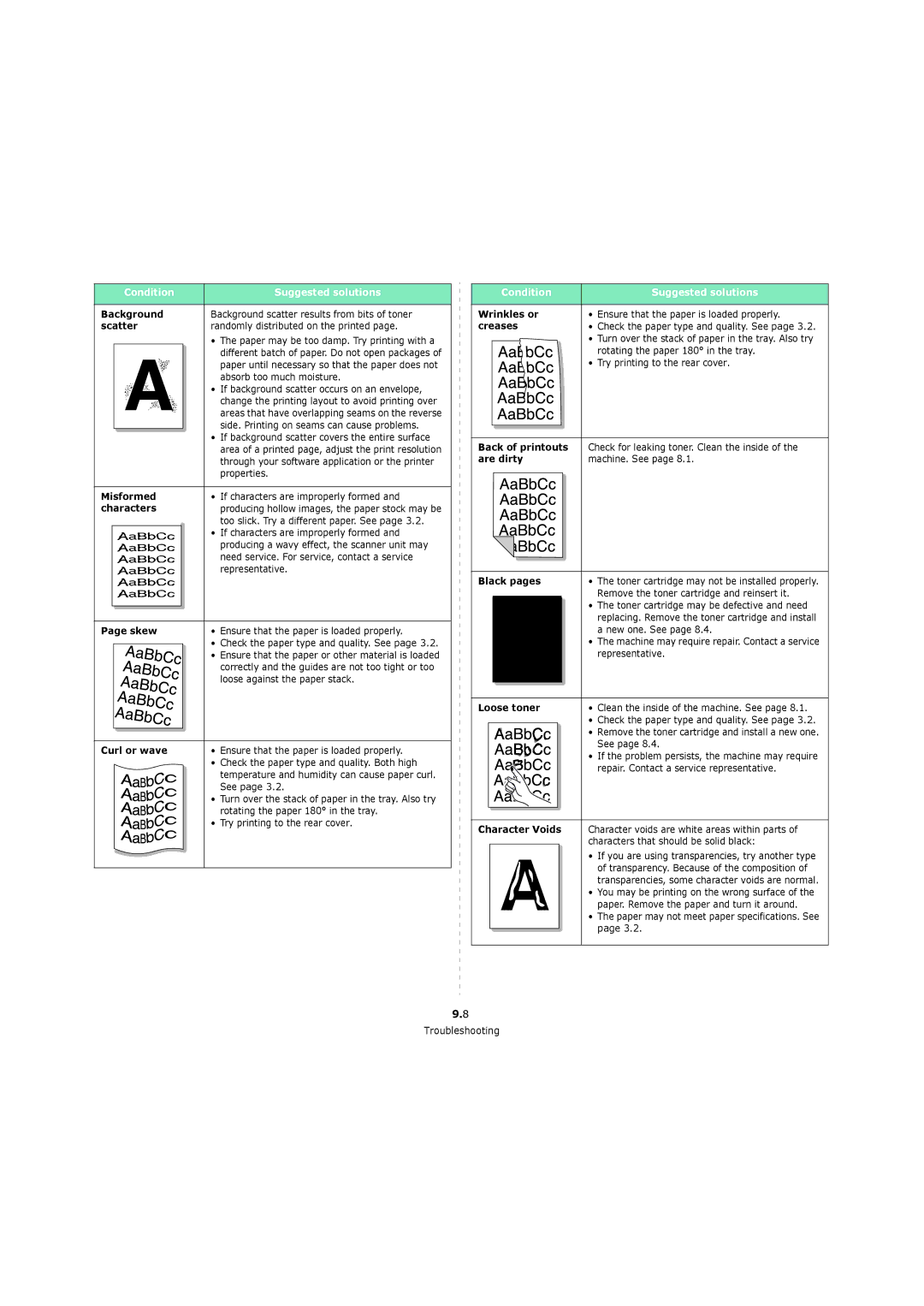
|
| Condition | Suggested solutions |
|
|
|
|
Background | Background scatter results from bits of toner | ||
scatter | randomly distributed on the printed page. | ||
|
|
| • The paper may be too damp. Try printing with a |
|
|
| different batch of paper. Do not open packages of |
|
|
| paper until necessary so that the paper does not |
|
|
| absorb too much moisture. |
|
|
| • If background scatter occurs on an envelope, |
|
|
| change the printing layout to avoid printing over |
|
|
| areas that have overlapping seams on the reverse |
|
|
| side. Printing on seams can cause problems. |
|
|
| • If background scatter covers the entire surface |
|
|
| area of a printed page, adjust the print resolution |
|
|
| through your software application or the printer |
|
|
| properties. |
|
|
|
|
Misformed | • If characters are improperly formed and | ||
characters | producing hollow images, the paper stock may be | ||
|
|
| too slick. Try a different paper. See page 3.2. |
|
|
| • If characters are improperly formed and |
|
|
| producing a wavy effect, the scanner unit may |
|
|
| need service. For service, contact a service |
|
|
| representative. |
|
|
|
|
|
|
|
|
Page skew | • Ensure that the paper is loaded properly. | ||
|
|
| • Check the paper type and quality. See page 3.2. |
|
|
| • Ensure that the paper or other material is loaded |
|
|
| correctly and the guides are not too tight or too |
|
|
| loose against the paper stack. |
|
|
|
|
|
|
|
|
Curl or wave | • Ensure that the paper is loaded properly. |
| • Check the paper type and quality. Both high |
| temperature and humidity can cause paper curl. |
| See page 3.2. |
| • Turn over the stack of paper in the tray. Also try |
| rotating the paper 180° in the tray. |
| • Try printing to the rear cover. |
Condition | Suggested solutions |
|
|
Wrinkles or | • Ensure that the paper is loaded properly. |
creases | • Check the paper type and quality. See page 3.2. |
| • Turn over the stack of paper in the tray. Also try |
| rotating the paper 180° in the tray. |
| • Try printing to the rear cover. |
Back of printouts | Check for leaking toner. Clean the inside of the |
are dirty | machine. See page 8.1. |
Black pages |
| • The toner cartridge may not be installed properly. | ||
|
|
|
| Remove the toner cartridge and reinsert it. |
|
|
|
| • The toner cartridge may be defective and need |
|
|
|
| |
|
|
|
| replacing. Remove the toner cartridge and install |
|
|
|
| a new one. See page 8.4. |
|
|
|
| • The machine may require repair. Contact a service |
|
|
|
| representative. |
|
|
|
|
|
|
|
|
|
|
Loose toner | • Clean the inside of the machine. See page 8.1. | ||
|
|
| • Check the paper type and quality. See page 3.2. |
|
|
| • Remove the toner cartridge and install a new one. |
|
|
| See page 8.4. |
|
|
| • If the problem persists, the machine may require |
|
|
| repair. Contact a service representative. |
|
|
|
|
|
|
|
|
Character Voids | Character voids are white areas within parts of | ||
|
|
| characters that should be solid black: |
|
|
| • If you are using transparencies, try another type |
|
|
| of transparency. Because of the composition of |
|
|
| transparencies, some character voids are normal. |
|
|
| • You may be printing on the wrong surface of the |
|
|
| paper. Remove the paper and turn it around. |
|
|
| • The paper may not meet paper specifications. See |
|
|
| page 3.2. |
|
|
| |
9.8
